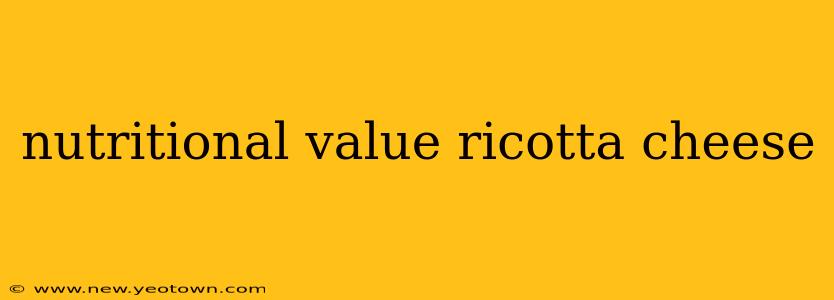Ricotta cheese. Just the name conjures images of creamy pasta sauces, fluffy cheesecakes, and light and airy fillings. But beyond its delightful texture and versatility, lies a surprisingly nutritious profile. Let's delve into the world of ricotta, uncovering its nutritional secrets and exploring why it deserves a prominent place in a balanced diet.
Our story begins in Italy, where ricotta, meaning "recooked," was born. Unlike other cheeses made from curdled milk, ricotta is made from the whey leftover after making other cheeses. This whey, rich in proteins and lactose, is gently heated and acidified, causing the proteins to separate and form the soft, delicate curds we know and love. This process results in a cheese that's naturally lower in fat and higher in protein and certain minerals compared to many of its harder cheese counterparts.
What are the nutritional benefits of ricotta cheese?
Ricotta is a nutritional powerhouse, packed with essential vitamins and minerals. Let's break down some of the key benefits:
-
High in Protein: Ricotta is an excellent source of protein, crucial for building and repairing tissues, supporting a healthy immune system, and keeping you feeling full and satisfied. This makes it a great option for weight management and muscle growth.
-
Good Source of Calcium: Calcium is essential for strong bones and teeth, and ricotta provides a generous helping. This is particularly important for growing children and adults aiming to maintain bone density as they age.
-
Rich in Vitamin B12: Often lacking in vegetarian and vegan diets, vitamin B12 is vital for nerve function, red blood cell production, and DNA synthesis. Ricotta is a valuable source of this essential nutrient.
-
Contains Riboflavin (Vitamin B2): Another B vitamin, riboflavin contributes to energy metabolism and supports healthy skin, eyes, and nails.
-
Lower in Fat (Compared to Other Cheeses): While the fat content can vary depending on the type of milk used and the production process, ricotta is generally lower in fat than many other cheeses, making it a more heart-healthy option. Part skim or whole milk ricotta will differ in fat content.
How many calories are in ricotta cheese?
The calorie count in ricotta cheese fluctuates based on the type (whole milk, part-skim, etc.). A typical serving (about 1/2 cup) of whole milk ricotta contains around 170-200 calories. Part-skim varieties will naturally have fewer calories. Always check the nutrition label on your specific product for accurate calorie information.
Is ricotta cheese good for weight loss?
Because of its high protein content and relatively lower fat content (compared to some cheeses), ricotta can be a valuable addition to a weight-loss diet. The protein helps you feel full, reducing overall calorie intake, and it supports muscle mass, boosting metabolism. However, moderation is key, as even lower-fat varieties still contain calories.
Is ricotta cheese healthy for pregnant women?
Yes, ricotta cheese can be part of a healthy pregnancy diet, providing essential nutrients like calcium and protein for both mother and baby's development. However, as with all cheeses, ensuring it's pasteurized is crucial to avoid the risk of listeria.
What are the potential drawbacks of eating ricotta cheese?
While generally a healthy food, excessive consumption of ricotta can contribute to weight gain due to its calorie content. Individuals with lactose intolerance may experience digestive discomfort. Also, always choose pasteurized ricotta to avoid potential foodborne illnesses.
Conclusion: A Delicious and Nutritious Addition to Your Diet
Ricotta cheese, with its creamy texture and impressive nutritional profile, offers a delicious and healthy addition to a balanced diet. From its high protein content to its rich mineral profile, this versatile cheese is a worthy addition to your culinary repertoire. Remember to choose wisely, considering fat content and always opting for pasteurized varieties for safety. So go ahead, enjoy that creamy pasta, that fluffy cheesecake, or that delightful ricotta filling – your body will thank you!

